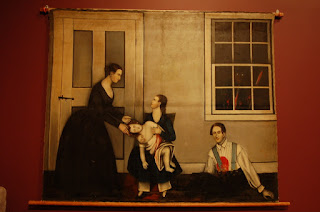THE CONSPIRACY OF CHRIST
“And in my prayers, my sins were moved from me, and I was lightened, and I thought I could fly. I felt as though I could fly……..’Glory to God! Glory to God!” -Jack Hodges, Black Jacob
“Then what, Mike?”
“Why he told me to strip off my shirt and hug the very post that Mr. Heart [Hart] tied you to. He tied me and the first blow that struck upon my poor back made me wish with streaming eyes that I didn’t go to sea…”
“Did you holler, Mike?”
I know I should have footnoted as I went along. Now it’s gonna be a tough slog to academic acceptance. I really don’t care. Sue me. The preceding ital. dialog is courtesy of Austin Reed. I’ve gotten you to read this far only partly by lying, stealing or hiding my insanity. Actually I’ve had to lie or plagiarize very little. If I’m crazy you be the judge. If I did slip up, it’s either out of ignorance or laziness, not malice or any conscious attempt to mislead by artificially propelling the narrative forward. Crane’s fairness and honesty are the aspiration, but admittedly, like he, I’m limited by my “weak mental machinery.” I find myself unconsciously using the “we” when referring to the whites, or “they” in regard to the Indian, or African Americans. It’s impossible to avoid toxic guilt or for that matter misplaced pride. No matter who dropped the deadfall across the raging stream, the whites were not equipped, nor predisposed to make better decisions and tip-toe across the dark, murky waterways without rolling the log. The alien always slips up.
The illiterate Jack Hodges is still back there, chained to the wall of his cell, with just his bible to keep him company. Lets backtrack a bit. Ten years before William Freeman was running for his life through the Auburn woods, Jack was mouthing these words in his monastic cell in the penitentiary: “Deliver me from blood-guiltiness, O God, thou God of my salvation.”
Although separated from government on freshly printed paper in North America, Judaeo-Christianity was (and still is) intimately connected to all aspects of society and that includes the academic, political, judicial and penal systems. The state was doing God’s bidding and the Protestant reformers became partners in all things under Christ. As historian W. David Lewis puts it, “Retribution was initially meted out to the felon by his victims or their blood relatives, but in time societies selected officials to deal with offenders in the name of the group. The primordial thirst for revenge never completely disappeared, but it was eventually supplemented by religious or ethical considerations.”
Without anything close to an objective account of Jack’s time at Auburn Prison we are left with the narrow view, from the prejudicial pulpit of Rev. Ansel Doane Eddy. In his book Black Jacob, A Monument of Grace, Eddy lays out a ridiculously evangelic parable of magical proportions, crediting “the silence and solemnity” of Auburn Prison, and the alchemic transmutation of the bible, in his monkish, narrow cell, as the theopathy that “subdues his [Jack’s] rough spirit.”
When Jack Hodges was transferred to Auburn Prison, knowingly or not, he became a willing accomplice in the clergy’s plan to fuse religiosity with secular reformation—a conspiracy of Christ and State. Even with Jack’s long history with the clergy it remains to be seen just who’s playing whom? Both are so damned convincing. Rev. Eddy’s Sunday School Union conversion tract, with all its ascetic language, lent legitimacy to Auburn’s repressive practices, holding Jack Hodges up as a glowing example, proof positive of the efficacy of the state’s policies of solitary confinement and corporal punishment. Still, it’s hard to be sure just where the exploitation lies. I tend to think manipulation was happening on both sides. Jack and the clergy seem to have had a mutually advantageous relationship from the very beginning. The state willingly joined forces with the clergy and Jack—all on bended knee. Before we can take William Freeman back into custody, we can’t forget Jack Hodges is still “reading” his bible back in his cell. His years at Auburn had been productive and if we are to believe Rev. Ansel Eddy, revelatory. And I don’t believe Rev. Eddy, or for that matter Jack, for one minute.
Ansel Eddy’s first meeting with Jack Hodges was, coincidentally, on the same day Rev. Austin Steward addressed his Rochester congregation on the dangers of moving to the big city, July 4, 1827, the date of full emancipation of slaves in New York state.
Revs. Cadle, Eddy, Dwight, Curtis….all of them, had more than a passing interest in Jack Hodges. But it was Ansel Eddy who fully capitalized on Hodges. Eddy had been an early participant in the “New Measure” revivalism of the 1820’s and 30’s in western New York and with the help of famous men like perfectionist Charles G. Finney, his Congregational Church in Canandaigua was bursting with converts by the time Jack Hodges ended up in Auburn. It would be Jack Hodges who would become the trope of penitence that would gain Eddy fame and even more followers. Even the editors at Random House credit Ansel Eddy’s “heavily edited, by the white ministers…who ran the penal system,” Black Jacob, with finding a wide audience, eager to read a writer (like Austin Reed) “Speaking from a jail cell or addressing the public from the scaffold, with a noose around their throats…” Jack had first hand experience with being one step from the gallows and come out of the “system” a changed man. He was (and still is) excellent copy. Forgotten now, at the time, Ansel Eddy’s book—Black Jacob, would be a raging success on the religious tract circuit and possibly an inspiration to Austin Reed.

Comments
Post a Comment